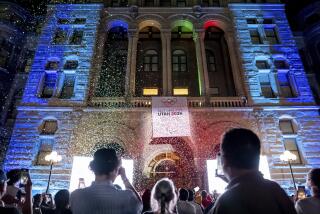$10 for a Beer? Welcome to Salt Lake
- Share via
SALT LAKE CITY — Barely audible above the lunch-rush din at Caputo’s Market and Deli, Sue Pace was adamant. “It’s all about greed,” she said, shaking her head. “We didn’t even think about it, not once.”
The source of Pace’s consternation: rampant price gouging during the Olympics at restaurants, hotels and parking lots. By some accounts, a good number of Pace’s competitors have raised prices by 20% since the Winter Games began last week. Some have introduced “Olympic menus,” featuring higher prices and fewer choices. Most have instituted an automatic 18% gratuity.
Price hikes are a predictable business response to the hundreds of thousands of people here for the Games--10,000 journalists and more than 150,000 visitors daily--driven by the law of supply. Fans at the Olympic venues are also a captive audience, evidently willing to pay $4 for a small bottle of water.
Elsewhere around here, business owners face a tantalizing proposition: the possibility of making a year’s worth of profit in two weeks by raising prices to out-of-towners they may never see again.
Many succumb to the lure of profits, but other business owners here have taken a different view, refusing to hike prices or, in some cases, offering a 15% discount to anyone showing a Utah driver’s license.
“We want the visitors to come, but we also want our regulars to feel we haven’t abandoned them,” Pace said, gesturing around her teeming store. “You will all leave town after the Games, and we will rely on our regular customers for our business. I think it’s simply wrong to raise prices for two weeks, only to lower them later.”
At the Market Street Grill, manager Will Keesen said the restaurant is adding an 18% tip to every check because tipping is not a universal custom. Some menus have a round red sticker informing diners of the new policy.
Still, Keesen said, prices are unchanged.
“We’ve been in business for 20 years,” he said. “I think it would be pretty shortsighted to do something like that, even though I know our competitors are doing it.”
They are doing it with great gusto. Take the “Olympic menu,” for example. At least one posh restaurant has adopted a prix fixe menu, $95 for a three-course meal. The offerings are the same that the restaurant had the week before, just fewer of them and at a higher price.
Media members and others with readily identified laminated badges are easy targets for scammers. Todd Panagopoulos, a Chicago Tribune photographer, said he and a group went to dinner this week and encountered a $10 bottle of beer and a $6.50 piece of sushi.
Hotel rooms are at a premium, and even modest rooms are garnering four-star rates. As the Games began, most of the 32,000 hotel, motel, condominium and bed-and-breakfast rooms within a two-hour drive of Salt Lake City were booked, according to the Utah Hotel and Lodging Assn.
Market forces allow the dowdy $79-a-night hotel across from the main press center here to quadruple its rates. And it’s full of grateful guests.
“We’ve had some fleabag hotels solicit people from out of state and lead them to believe that paying $250 a night would be a good deal,” said Michael DeGroote of the Salt Lake Chamber of Commerce. “Unfortunately, it’s a hotel you wouldn’t let your dog stay in.”
Even parking lots have jacked up prices. Rates range from $5 a day, a bargain if you can get it, to $25. The Gateway Center is the most convenient parking lot for those attending the skating events at the Delta Center. Normally parking there is free for the first hour. Now the rate is $5 a day, and patrons are issued a coupon that invites them to return after the Games and park free.
Salt Lake residents have been warned for two years to expect this kind of inflation. But all the warnings in the world haven’t prepared them for Tokyo-type prices overnight.
Stacie Hancock and her group of 20-something friends from Ogden were put off by $7 beers. “I have to say, beer is way overpriced. Cocktails--forget it,” Hancock said. “It’s ridiculous. The whole thing is kind of bad for locals.”
The group decided this would be their first and last foray into downtown restaurants during the Olympics.
Price gouging and even ticket scalping are legal here. Although Georgia enacted laws against price gouging before the 1996 Summer Games in Atlanta, Utah has not followed suit, preferring to allow businesses to set their own prices.
Olympic fans seem to have adopted a kind of group shrug about it, accepting the prices as an expensive lesson in free enterprise. Applying a moral or ethical code to business practice offers no simple answers.
Quinn McKay, a professor of business ethics at the University of Utah, offers a seasoned perspective.
“Our private enterprise engine is fired by personal greed,” he said. “My thesis in studying human behavior is that all behavior is motivated by self-interest. To live by the golden rule puts you at a disadvantage in the business world. What’s happening here is normal, unconscionable and the way of the world. All we have is the ‘everyone else is doing it’ defense.”
More to Read
Go beyond the scoreboard
Get the latest on L.A.'s teams in the daily Sports Report newsletter.
You may occasionally receive promotional content from the Los Angeles Times.








